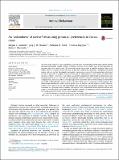Files in this item
An ‘unkindness’ of ravens? Measuring prosocial preferences in Corvus corax
Item metadata
| dc.contributor.author | Lambert, Megan L. | |
| dc.contributor.author | Massen, Jorg J. M. | |
| dc.contributor.author | Seed, Amanda M. | |
| dc.contributor.author | Bugnyar, Thomas | |
| dc.contributor.author | Slocombe, Katie E. | |
| dc.date.accessioned | 2017-01-05T12:30:11Z | |
| dc.date.available | 2017-01-05T12:30:11Z | |
| dc.date.issued | 2017-01 | |
| dc.identifier | 248212070 | |
| dc.identifier | 84c3d0f7-6db3-4f0e-b3e7-3a8b8812294e | |
| dc.identifier | 85006474640 | |
| dc.identifier | 000391840900041 | |
| dc.identifier.citation | Lambert , M L , Massen , J J M , Seed , A M , Bugnyar , T & Slocombe , K E 2017 , ' An ‘unkindness’ of ravens? Measuring prosocial preferences in Corvus corax ' , Animal Behaviour , vol. 123 , pp. 383-393 . https://doi.org/10.1016/j.anbehav.2016.11.018 | en |
| dc.identifier.issn | 0003-3472 | |
| dc.identifier.other | RIS: urn:98E7B0B53C076BD52892B6664836344F | |
| dc.identifier.other | ORCID: /0000-0002-3867-3003/work/60426867 | |
| dc.identifier.uri | https://hdl.handle.net/10023/10046 | |
| dc.description | J.J.M.M. was funded by a Lise Meitner and a Stand Alone grant of the Austrian Science Fund (FWF, numbers M 1352 and P26806), and T.B. was funded by the DK Program Cognition and Communication (FWF no.: W 1234) and a START Grant (FWF no.: Y 366-B17). | en |
| dc.description.abstract | In recent years, there has been considerable research effort to determine whether other species exhibit prosocial motivations parallel to those of humans; however, these studies have focused primarily on primates, and with mixed results. We presented captive ravens with a modified prosocial choice task which aimed to address several criticisms of previous methods by including a stringent pretraining regime and a set-up that disentangles motivation to provision a conspecific from motivation to feed next to one. In this task six subjects received no rewards for themselves but could choose to deliver food rewards to either a conspecific or an empty, inaccessible compartment. Subjects did not demonstrate any prosocial tendencies (i.e. they did not preferentially choose to reward a conspecific over the empty compartment), and instead often ceased pulling on test trials when they received nothing for themselves (up to 70% of 80 trials with a partner present, up to 83% of 40 trials in a nonsocial control condition). The relationship between the subject and the partner had no influence on the subject's choices; however, subjects were more likely to pull immediately after performing socio-agonistic displays. Our results contribute to a growing body of evidence that despite their sophisticated social cognitive abilities and range of cooperative behaviours exhibited in the wild, unpaired (or unbonded) ravens do not seem to act to benefit conspecifics in the absence of immediate self-gain. | |
| dc.format.extent | 11 | |
| dc.format.extent | 775522 | |
| dc.language.iso | eng | |
| dc.relation.ispartof | Animal Behaviour | en |
| dc.subject | Altruism | en |
| dc.subject | Avian cognition | en |
| dc.subject | Corvid | en |
| dc.subject | Corvus corax | en |
| dc.subject | Prosociality | en |
| dc.subject | Raven | en |
| dc.subject | BF Psychology | en |
| dc.subject | QH301 Biology | en |
| dc.subject | NDAS | en |
| dc.subject.lcc | BF | en |
| dc.subject.lcc | QH301 | en |
| dc.title | An ‘unkindness’ of ravens? Measuring prosocial preferences in Corvus corax | en |
| dc.type | Journal article | en |
| dc.contributor.institution | University of St Andrews. School of Psychology and Neuroscience | en |
| dc.contributor.institution | University of St Andrews. ‘Living Links to Human Evolution’ Research Centre | en |
| dc.contributor.institution | University of St Andrews. Institute of Behavioural and Neural Sciences | en |
| dc.contributor.institution | University of St Andrews. Centre for Social Learning & Cognitive Evolution | en |
| dc.identifier.doi | https://doi.org/10.1016/j.anbehav.2016.11.018 | |
| dc.description.status | Peer reviewed | en |
| dc.identifier.url | http://www.sciencedirect.com/science/article/pii/S000334721630313X#appd001 | en |
This item appears in the following Collection(s)
Items in the St Andrews Research Repository are protected by copyright, with all rights reserved, unless otherwise indicated.

